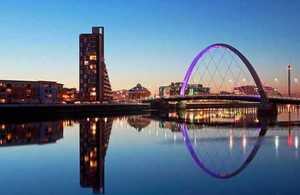Glasgow a world-leading smart city with support from Innovate UK
Future city demonstrator delivers £144 million return from £24 million of funding, to the benefit of local people and businesses.

18 cities have visited Glasgow to learn about the smart initiatives.
Cities are having to become smarter, safer and more sustainable to remain great places to live and work.
In 2013 Glasgow was awarded £24 million of funding from Innovate UK to become a future city demonstrator site, developing digital infrastructure and data initiatives to make it an interconnected smart city.
A recent report shows that the programme has had a positive effect on the local economy and residents, delivering a return on investment of £144 million.
The project demonstrates how technology and data can create integrated, digital public services that meet the changing needs of citizens, communities and businesses, in areas such as energy, health, public safety and transport.
Scottish Secretary, David Mundell visited the City Operations Centre in Glasgow on 6 November 2017. He commended the project and the great results it has achieved for local businesses, visitors and communities.
Intelligent street lights
One element of the programme, Glasgow Operations Centre, brings together traffic management, security and public space CCTV. This consolidated view of the city supports mobile working and data projects with estimated saving of £5 million.
Energy costs have reduced, with areas of the city fitted with intelligent street lights that adjust in brightness according to the activity around them. The lights save 68% of energy compared to conventional street lights and are fitted with smart sensors that deliver valuable data, including pollution levels and footfall.
Dr Robert Rogerson, from the Institute for Future Cities, Technology and Innovation Centre, said:
Making connections between different problems, between different solutions and different players, is fundamental.
Designing a future city for citizens
Community engagement is playing an important role in data gathering and mapping the city. Apps designed for walkers and cyclists help citizens plan travel routes, monitor traffic congestion and record their journeys. This information is used to improve infrastructure and the surrounding environment.
The vast amount of data being gathered is also available as 400 open datasets. These are freely available to the public and can be used by anyone to create new and innovative solutions in the future.
Gary Walker, Programme Director, Future City Glasgow, said:
The use of the data sets has allowed new products to be created, resulting in jobs and revenue.
Unlocking the potential of open data
Local businesses also report significant benefits from their involvement in the programme, with 63% of SMEs attracting additional business.
Design agency, Jamhot has enjoyed increased visibility since adding Future City Glasgow to its portfolio. Creative Partner, Graeme McGowan, explained:
It was really good for us. It has indirectly led to us getting to pitch for several projects and we’ve actually just this week been successful in winning one such project.
The legacy of the project continues to pay dividends with Glasgow already attracting a further £12 million in external investment. It has attracted worldwide interest and representatives from 18 cities have visited the area to learn about the smart initiatives.
Gary Walker added:
The economy will benefit from a further £23 million of investment due to events hosted in the city and in relation to sustainable and smart activity. This is just the beginning of a hugely exciting journey for Glasgow.